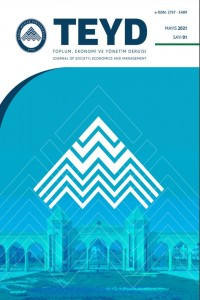KAMU POLİTİKASI TRANSFERİ ve ULUSLARARASI ÖRGÜTLER
Kamu Politikası, Politika Transferi, Uluslararası Örgütler, Küreselleşme, Yönetişim
PUBLIC POLICY TRANSFER and INTERNATIONAL ORGANIZATIONS
___
- Ateş H. (2002). “Kamu Örgütlerine Yönelik Yönetsel Bilgi ve Siyasa Aktarımı: Eleştirel Bir İnceleme”. İ. Ü. Siyasal Bilgiler Fakültesi Dergisi, (27), 7-26.
- Babaoğlu, C. (2017). “Kamu Politikası Analizine Yönelik Kavramsal ve Kuramsal Bir Çerçeve”. Yönetim Bilimleri Dergisi, 15 (30), 511-532.
- Bauer M. W. ve J. Trondal (2015). The Administrative System of the European Union, The Palgrave Handbook of the European Administrative System. (Ed. E. M. W. Bauer ve J. Trondal), New York: Palgrave Macmillan, 1-30.
- Biçer, M. ve H. Yılmaz (2009). “Parlamentonun Kamu Politikası Oluşturma ve Planlama Sürecindeki Konumunun, Yeni Kamu Mali Yönetim Sistemi Çerçevesinde Değerlendirilmesi”. Yasama Dergisi, (13), 45-84.
- Bowornwathana, B. (2001). Politics of Governance Reform in Thailand. Handbook of Comparative and Development Public Administration Second Edition, Revised and Expanded, (Ed. A. Farazmand), New York: Macel Dekker Inc, 421-444.
- Demir, F. (2011). “Kamu Politikası ve Politika Analizi Çalışmalarının Teorik Çerçevesi”. Dumlupınar Üniversitesi Sosyal Bilimler Dergisi, (30), 107-120.
- Demmers, J.; A. E. F. Jilberto ve B. Hogenboom (2005). Good Governance and Democracy in a World of Neoliberal Regimes. Good Governance in the Era of Global Neoliberalism: Conflict and Depolitisation in Latin America, Eastern Europe, Asia and Africa, (Ed. J Demmers, A. E. F. Jilberto ve B. Hogenboom), New York: Routledge, 1-32.
- Dolowitz, D. ve D. Marsh (1996). “Who Learns What From Whom: A Review of the Policy Transfer Literature”. Political Studies, (44), 343-357.
- Garcia-Zamor, J.-C. (2001). Development Administration in the Early Americas: Aztecs, Incas, and Mayas. Handbook of Comparative and Development Public Administration Second Edition, Revised and Expanded, (Ed. A. Farazmand), New York: Macel Dekker Inc., 89-102.
- Geddes, B. (2007). What Causes Democratization?. The Oxford Handbook of Comparative Politics (Ed. Carles Boix ve Susan Stokes), New York: Oxford University Press, 317-339.
- Gould, D. J. (2001). Administrative Corruption: Incidence, Causes, and Remedial Strategies. Handbook of Comparative and Development Public Administration Second Edition, Revised and Expanded, (Ed. A. Farazmand), New York: Macel Dekker Inc., 761-774.
- Gül, H. (2015). “Kamu Politikası Analizi, Yöntemleri ve Teknikleri”. Yasama Dergisi, (29), 5-31.
- Haktankaçmaz, M. İ. (2010). “Reform Transferinde Uluslararası Örgütlerin Rolü”. Uluslararası Hukuk ve Politika, 22 (6), 23-54.
- Hauss, C. (2002). Comparative Politics: Domestic Responses to Global Challenges (4th Edition). Stamford: Wadsworth Publishing.
- Heywood, A. (2012). Siyasetin Temel Kavramları. (Çev. H. Özler), Ankara: Adres Yayınları.
- Jakobi, A. P. (2009). International Organizations and Lifelong Learning: From Global Agendas to Policy Diffusion. Hampshire: Palgrave Macmillan.
- Jreisat, J. E. (2005). “Comparative Public Administration Is Back in, Prudently”. Public Administration Review, 65 (2), 231-242.
- Köseoğlu, Ö. (2013). “Meslek, Sanat ve Disiplin Olarak Kamu Politikası: Türkiye’ye İzdüşümleri”. Bilgi, (26), 4-36.
- Kurtz, W.; Y. M. Adwan ve R. B. Cunningham (2001). Challenges to Privatization in Developing Countries: A New Look, Handbook of Comparative and Development Public Administration Second Edition, Revised and Expanded, (Ed. A. Farazmand), New York: Macel Dekker Inc., 977-988.
- Kutlu, Ö. (2012). Karşılaştırmalı Kamu Yönetimi: Teorik Çerçeve ve Ülke Uygulamaları. Konya: Çizgi Kitabevi.
- Mamur Işıkçı, Y. (2017). “Türkiye’de Kamu Politikası Olarak 2000 Yılı Sonrası Uluslararası Göç Yönetiminin Analizi”. Yalova Sosyal Bilimler Dergisi, 7 (13), 25-47.
- Mossberger, K. ve H. Wolman (2003). “Policy Transfer As a Form of Prospective Policy Evaluation: Challenges and Recomendations”. Public Administration Review, 63 (4), 428-40.
- Neumayer, E. (2003). The Pattern of Aid Giving: The Impact of Good Governance on Development Assistance. New York: Routledge.
- Peters, B. G. (2001). Government Reform and Reorganization in an Era of Retrenchment and Conviction Politics. Handbook of Comparative and Development Public Administration Second Edition, Revised and Expanded, (Ed. A. Farazmand), New York: Macel Dekker Inc., 669-690.
- Pollitt, C. ve G. Bouckaert (2011). Public Management Reform: A Comparative Analysis New Public Management. Governance, and the Neo-Weberian State (3rd Edition), New York: Oxford University Press.
- Rigos, P. N. (2001). The Prospects for Modernization of Public Administration in Postdictatorial Greece. Handbook of Comparative and Development Public Administration Second Edition, Revised and Expanded, (Ed. A. Farazmand), New York: Macel Dekker Inc., 379-396.
- Siffin, A. (2001). Problem of Development Administration. Handbook of Comparative and Development Public Administration Second Edition, Revised and Expanded, (Ed. A. Farazmand), New York: Macel Dekker Inc., 1-8.
- Smith, K. B. ve C. W. Larimer (2009). The Public Policy Theory Primer. Philadelphia: Westview Press.
- Sobacı, Z. (2011). “Politika Transferi Bağlamında Kamu Yönetiminde Neo-Liberal Reformların Yayılması: Açık Toplum Enstitüsünün Rolü”. Sosyoekonomi, (2), 191-210.
- Şener, H. E. (2008). “Avrupa Birliği Neo-Liberalizm ve İdari Reform İlişkisi”. Memleket Siyaset Yönetim, 3 (7), 112-137.
- Unsworth, S. (2007). Focusing on Good Governance: Can It Work?, Exporting Good Governance: Temptations and Challenges in Canada’s Aid Program. (Ed. Jennifer Welsh ve Ngaire Woods), Waterloo: Wilfrid Laurier University Press, 21-40.
- Usta, A. (2013).” Kamu Politikaları Analizine Kuramsal Bir Bakış”. Yasama Dergisi, (24), 78-102.
- Welsh, J. ve N. Woods (2007). Introduction, Exporting Good Governance: Temptations and Challenges in Canada’s Aid Program. (Ed. Jennifer Welsh ve Ngaire Woods), Waterloo: Wilfrid Laurier University Press, xi-xx.
- Woods, N. (2007). The Changing Politics of Aid. Exporting Good Governance: Temptations and Challenges in Canada’s Aid Program, (Ed. Jennifer Welsh ve Ngaire Woods), Waterloo: Wilfrid Laurier University Press, 3-19.
- WPGG-Water Policy and Governance Group (2010). Exploring the Role of Policy Transfer in Water Governance: A Discussion Paper. http://www.wpgg.ca/sites/default/files/Swainson_&_deLoe_2010.pdf (18.06 2013).
- Yayın Aralığı: Yılda 3 Sayı
- Başlangıç: 2020
- Yayıncı: Kütahya Dumlupınar Üniversitesi
AMİRAN KURTKAN BİLGESEVEN’İN BÜTÜNCÜ YAKLAŞIMI ÜZERİNE BİR DEĞERLENDİRME
STRATEJİK PAZARLAMA MUHASEBESİ AÇISINDAN “PAZARLAMA 4.0” KAVRAMININ ÖNEMİ
KAMU POLİTİKASI TRANSFERİ ve ULUSLARARASI ÖRGÜTLER
NİJER'DE VERGİ KAÇAKÇILIĞININ NEDENLERİ
HALK İNANIŞLARININ MİTOLOJİK KÖKENLERİ: KONYA (KADINHANI) ÖRNEĞİ
